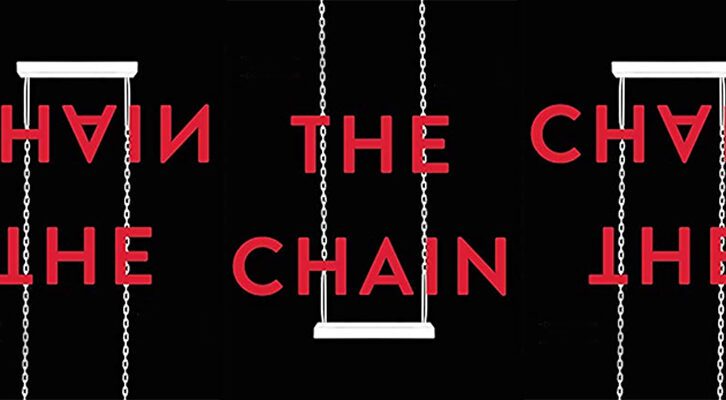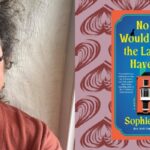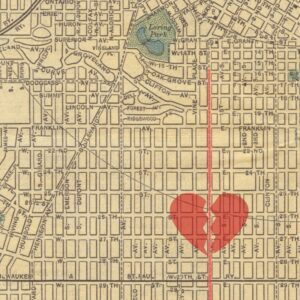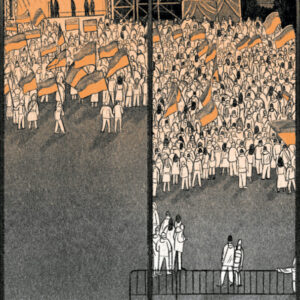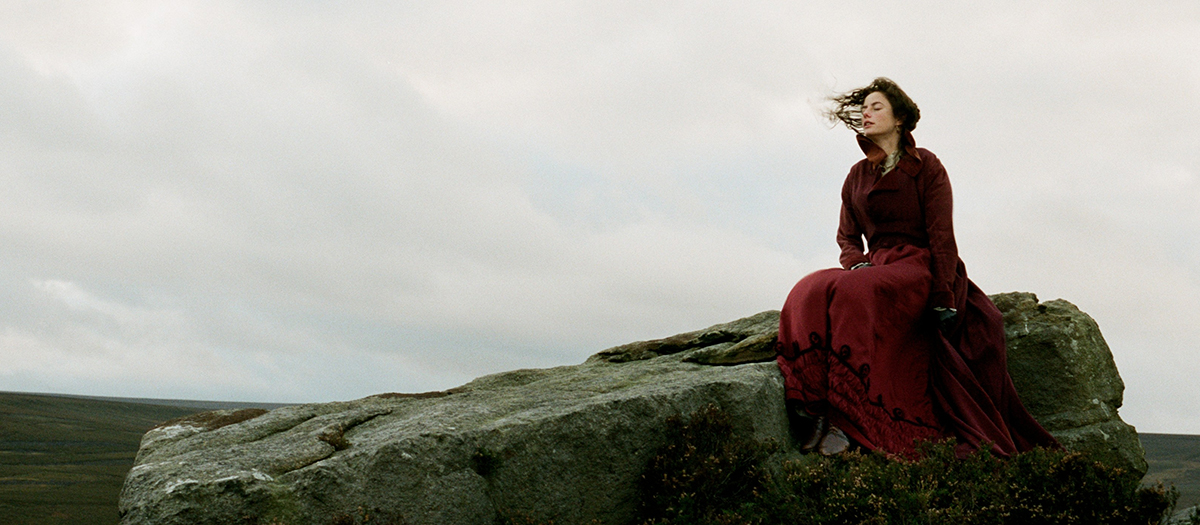
Wuthering Heights is a Virgin's Story, and Other Opinions of Brontë's Classic
200 Years of Writers Weighing in on Wuthering Heights
Two hundred years ago today, Emily Brontë was born. She died only 30 years later, of tuberculosis. Her coffin was only 16 inches wide (though this may not mean what we think it means). She wrote one complete novel, which has become an enduring classic of English literature. Ernest Hemingway, Joan Didion, and Henry Miller recommended it. Sylvia Plath and Ted Hughes borrowed its title for poems. Others, some of them right here in the Literary Hub office, don’t care for it quite so much. For Brontë’s birthday, I offer to you a selection of literary opinions on her one hit wonder, which was polarizing at the time of its publication and remains so 171 years later.
Virginia Woolf:
Wuthering Heights is a more difficult book to understand than Jane Eyre, because Emily was a greater poet than Charlotte. When Charlotte wrote she said with eloquence and splendour and passion “I love”, “I hate”, “I suffer”. Her experience, though more intense, is on a level with our own. But there is no “I” in Wuthering Heights. There are no governesses. There are no employers. There is love, but it is not the love of men and women. Emily was inspired by some more general conception. The impulse which urged her to create was not her own suffering or her own injuries. She looked out upon a world cleft into gigantic disorder and felt within her the power to unite it in a book. That gigantic ambition is to be felt throughout the novel — a struggle, half thwarted but of superb conviction, to say something through the mouths of her characters which is not merely “I love” or “I hate”, but “we, the whole human race” and “you, the eternal powers . . . ” the sentence remains unfinished. It is not strange that it should be so; rather it is astonishing that she can make us feel what she had it in her to say at all.
–from her 1916 essay “Jane Eyre and Wuthering Heights,” as published in The Common Reader
Alice Hoffman:
[My favorite novelist of all time is] Emily Brontë, author of the greatest psychological novel ever written, with the most complex character ever conceived. Read “Wuthering Heights” when you’re 18 and you think Heathcliff is a romantic hero; when you’re 30, he’s a monster; at 50 you see he’s just human.
–in her 2014 “By the Book” interview with The New York Times
Anne Rice:
Is there anybody out there who hasn’t heard of Heathcliff, the dark villian/hero of this high pitched and utterly committed work of madness? Oh, I love it. It was difficult for me at first. I’m a writer, but not a natural reader. But once I was into this book, once I stopped asking questions of the narrative and just entered the shadowy world of Catherine and her doomed household, I was quite literally spellbound. Bronte died believing this book was a failure. What a dreadful irony that this quiet, disciplined woman who lived out her life in a cold parsons’ house with her brilliant sisters, her drunken brother and her eccentric father (The man memorized Paradise Lost: imagine. And outlived all his children!) never even had an inkling that this outpouring of her heart and soul would become a classic, overshadowing even her sister’s highly successful Jane Eyre. Both Bronte sisters had the capacity to create archetypes—to imprint upon the culture seminal patterns that endure to the present time. One last point: the father was Irish. Madness and genius in the blood, indeed. Enjoy it. I read it over every year or so, sometimes twice in a row. I study it; I watch all the film versions. I just love it, the way it works, its strange cruelty and enchantment.
–as reviewed on Amazon in 2004 (oh yes, Anne Rice writes Amazon reviews)
Elizabeth Hardwick:
Wuthering Heights has a sustained brilliance and originality we hardly know how to account for. It is on a different level of inspiration from [Brontë’s] poetry; the grandeur and complication of it always remind one of the leap she might have taken had she lived.
. . .
Catherine, in Wuthering Heights, is nihilistic, self-indulgent, bored, restless, nostalgic for childhood, unmanageable. She has the charm of a wayward, schizophrenic girl, but she has little to give, since she is self-absorbed, haughty, destructive. What is interesting and contemporary for us is that Emily Brontë should have given Catherine the center of the stage, to share it along with the rough, brutal Heathcliff. In a novel by Charlotte or Anne, Cathy would be a shallow beauty, analyzed and despaired of by a reasonable, clever and deprived heroine. She would be fit only for the subplot. There is also an unromantic driven egotism in the characters, a lack of moral longings, odd in the work of a daughter of a clergyman.
. . .
The plot of Wuthering Heights is immensely complicated and yet there is the most felicitous union of author and subject. There is nothing quite like this novel with its rage and ragings, its discontent and angry restlessness.
Wuthering Heights is a virgin’s story. The peculiarity of it lies in the harshness of the characters. Cathy is as hard, careless, and destructive as Heathcliff. She too has a sadistic nature. The love the two feel for each other is a longing for an impossible completion. Consolations do not appear; nothing in the domestic or even in the sexual life seems to the point in this book. Emily Brontë appears in every way indifferent to the need for love and companionship that tortured the lives of her sisters. We do not, in her biography, even look for a lover as we do with Emily Dickinson because it is impossible to join her with a man, with a secret, aching passion for a young curate or a schoolmaster. There is a spare, inviolate center, a harder resignation amounting finally to withdrawal.
–in her essay on the Brontës in her 1974 collection Seduction and Betrayal: Women in Literature
Anne Tyler:
I have tried several times to read Wuthering Heights but it just strikes me as silly, so I always quit it. I don’t tell any of my friends this because women have very fond memories of reading it when they’re young and I don’t want to hurt their feelings.
–in a 2018 interview with The Guardian
I somehow made it to adulthood without ever reading Wuthering Heights, but then I found out that several of my women friends considered Heathcliff their all-time favorite romantic hero. So I read about three-quarters of it as a grown-up, and immediately developed some serious concerns about the mental health of my friends.
–in her 2015 “By the Book” interview with The New York Times
Maryse Condé:
When I read Wuthering Heights, I was 14. It was given to me at a prize ceremony for being good in writing. I read the book in September, which is rainy season in the Caribbean. I was lying on my bed in my bedroom, and for me it was an enchantment. I really was transported to wherever Emily Brontë wanted to transport me … and then I forgot all about it. I saw it at the cinema after that, by chance—the version with Laurence Olivier. It revived memories of my adolescence, so I read it again and discovered it had a meaning beyond the actual meaning, beyond the meanings the author wanted to give. It was a story you could transplant into any society. I was teaching a few years later and I discovered Jean Rhys, who wrote Wide Sargasso Sea, a rewriting of Jane Eyre. I thought, It’s not so bizarre that I’m attracted to Emily Brontë. Because, in fact, there is something about the Brontë sisters that speaks to Caribbean women, regardless of their color, regardless of their age, regardless of the time they live in. So I decided I was going to rewrite it. But it was at least another five years for me before I really started. Because my husband, who is English, was shocked when I was telling him my vague intention. He did not see the connection between the Caribbean and Brontë’s work. It seemed blasphemy to him to rewrite Brontë’s masterpiece. So I took another five years to decide—and when I could not help it, I started to write.
. . .
It is such a masterpiece, such a beloved work in England. For example, when we promoted the book in England we went to the Museum at Haworth, where Emily Brontë was born. People came to listen to me but I could see when they were sitting down looking at me, there was a kind of … I wouldn’t say fear, but a kind of shock. What is she doing to the text? How can she dare touch that text?! I really had to convince them that I did not do any disrespect to Brontë; on the contrary, I was paying homage to her. It seems to me the greatest homage that I pay is to her artistry.
And it is another way of telling people that you should not draw barriers between colors, ideas, et-cetera. Everybody says: But why an English novel? Why not a French one? Why not an African one? You see—it’s as if you should never cross a barrier, when, in fact, to live is to cross barriers.
–in a 1999 interview with BOMB about her novel Windward Heights, a re-interpretation of Brontë’s classic
Katherine Anne Porter:
And of course we read all the eighteenth-century novelists, though Jane Austen, like Turgenev, didn’t really engage me until I was quite mature. I read them both when I was very young, but I was grown up before I really took them in. And I discovered for myself Wuthering Heights; I think I read that book every year of my life for fifteen years. I simply adored it.
–in a 1963 interview with The Paris Review
Joyce Carol Oates:
This great novel, though not inordinately long, and, contrary to general assumption, not inordinately complicated, manages to be a number of things: a romance that brilliantly challenges the basic presumptions of the “romantic”; a “gothic” that
evolves—with an absolutely inevitable grace—into its temperamental opposite; a parable of innocence and loss, and childhood’s necessary defeat; and a work of consummate skill on its primary level, that is, the level of language. Above all, it is a history: its first statement is the date 1801; and one of its final statements involves New Year’s Day (of 1803). It seeks both to dramatize and to explain how the ancient stock of the Earnshaws are restored to their rights (the somber house of Wuthering Heights, built in 1500), and, at the same time, how and why the last of the Earnshaws, Hareton, will be leaving the Heights to live, with his cousin-bride, at Thrushcross Grange. One generation has given way to the next: the primitive energies of childhood have given way to the intelligent compromises of adulthood. The history of the Earnshaws and the Lintons begins to seem a history, writ small, albeit with exquisite detail, of civilization itself.
. . .
Heathcliff’s enduring appeal is approximately that of Edmund, Iago, Richard III, the intermittent Macbeth: the villain who impresses by way of his energy, his cleverness, his peculiar sort of courage; and by his asides, inviting, as they do, the audience’s or reader’s collaboration in wickedness. Brontë is perfectly accurate in having her villain tell us, by way of Mrs. Dean and Lockwood, that brutality does not always disgust; and that there are those persons— often of weak, cringing, undeveloped character—who “innately admire” it, provided they themselves are not injured. (Though, in Isabella’s case, it would seem that she has enjoyed, and even provoked, her husband’s “experimental” sadism.) Heathcliff presides over a veritable cornucopia of darksome episodes: he beats and kicks the fallen Hindley, he throws a knife at Isabella, he savagely slaps young Catherine, he doesn’t trouble to summon a doctor for his dying son, as he no longer has any use for him. Unfailingly cruel, yet sly enough to appear exasperated with his victims’ testing of his cruelty, Heathcliff arouses the reader to this peculiar collaborative bond by the sheer force of his language, and his wit: for is he not, with his beloved gone, the lifeforce gone wild? He has no opposition worthy of him; he has no natural mate remaining; he is characterless and depersonalized will—a masklike grimace that can never relax into a smile. (Significantly, Heathcliff is grinning as a corpse—”grinning at death” as old Joseph notes.) Very few readers of Wuthering Heights have cared to observe that there is no necessary or even probable connection between the devoted lover of Catherine, and the devoted hater of all the remaining world (including—and this most improbably—Catherine’s own daughter Catherine, who resembles her): for certain stereotypes persist so stubbornly they may very well be archetypes, evoking, as they do, an involuntary identification with energy, evil, will, action. The mass murderer who is really tenderhearted, the rapist whose victims provoke him, the Fuhrer who is a vegetarian and in any case loves dogs. . . Our anxieties, which may well spring from childhood experiences, have much to do with denying the actual physicality of the outrages, whether those of Heathcliff or any villain, literary or historic, and supplanting for them, however magically, however pitiably, “spiritual” values. If Heathcliff grinds his victims beneath his feet like worms, is it not natural to imagine that they are worms, and deserve their suffering, is it not natural to imagine that they are not us? We feel only contempt for the potential sadist Linton, who sucks on sugar candy, and whose relationship with his child-wife parodies a normal love relationship (he asks her not to kiss him, because it makes him breathless). Consequently our temptation is to align ourselves with Heathcliff, as Brontë shrewdly understands.
–from “The Magnanimity of Wuthering Heights,” originally published in Critical Inquiry, Winter 1983
Caryl Phillips:
I read it growing up but to me, as a young man, the most interesting aspect of the novel (because I was a boy) wasn’t the romance. Oh Heathcliff! Oh Cathy! I wasn’t interested in any of that stuff. It was the moors, the sort of bleak desolate nature of this place which was just on the periphery of Leeds. I was growing up in Leeds, a place where if you saw a blade of grass, you immediately ran out and kicked a football on it. We didn’t have gardens, certainly not in the place I was growing up in, in council houses. We went to the park to kick a ball, we didn’t go to learn the names of the trees. We didn’t go on expeditions to flora and fauna.
But as I was getting older, I was aware that right on the edge of Leeds, there was this wild strange place that, as an urban kid, meant nothing to me. So there were two books that I was reading at that time that introduced me to the idea that there’s another kind of life to England—not just a natural life, but a literary life too—that is rooted in nature. One book was Wuthering Heights and the other was The Return of the Native by Thomas Hardy, whose opening section is just about Egdon Heath. There aren’t any characters in it: the heath is the character. That was the prism through which I looked at Wuthering Heights, and I had no fascination with the origins of Heathcliff or the romance at the center of it. I didn’t even have any fascination with the Yorkshire dialect they’re speaking. It was just these brooding descriptions of this place that was slightly out of reach to me. When I reread the Brontës later on, again it wasn’t Cathy and Heathcliff’s romance or the Yorkshire dialect, it was more the isolation of Healthcliff. Why did he become so malevolent? Why did he become so cruel? Why was he so angry? Why was he so prey to these spasms of bitterness? There’s another element that completely fascinated me by that stage and that’s Emily Brontë herself, because I just loved the strange ethereal nature of the woman. And so I was as much fascinated with what kind of sensibility had written this as I was with what was in the book. And I think many years ago, when I wrote the novel Cambridge, I called the central character Emily because of Emily Brontë. In the novel she was about 30 or so—the age Brontë was when she died—and slightly strange, singular, willful. All the things I imagined Brontë might be. Obviously she’s not Emily Brontë, but there was a slight private doffing of the cap to this fascination with the creator of Wuthering Heights.
–in a 2015 interview with Public Books about The Lost Child, “an oblique, intricate re-writing” of Wuthering Heights
Philip Larkin:
It’s some time since I read [Wuthering Heights]. I never know what to think of it. In a way I don’t appreciate the emotion of Heathcliff’s love, or his hatreds—it doesn’t ‘come over’ to me: I think the novel splendidly constructed and written, but the central emotion doesn’t quite touch me, not like the emotion of, say, Lady Chatterley or Mr. Weston’s Good Wine or Tess or Jude, to name a few well worn okay works—only at the very end, when H. isn’t eating anything and doesn’t know if he’s coming or going, that part I like. Are people ‘moved’ by it, as by Lear or Othello? I don’t think I am. And Gothic—yes, but not Italian: German, isn’t it? Heathcliff to me is a sort of sprite of the bergs, a cousin to Mary Shelley’s monster, a creature of the northern mists, a gnome.
–in a letter to Monica Jones, August 19th, 1955
Charlotte Brontë:
I have just read over Wuthering Heights, and, for the first time, have obtained a clear glimpse of what are termed (and, perhaps, really are) its faults; have gained a definite notion of how it appears to other people — to strangers who knew nothing of the author; who are unacquainted with the locality where the scenes of the story are laid; to whom the inhabitants, the customs, the natural characteristics of the outlying hills and hamlets in the West Riding of Yorkshire are things alien and unfamiliar.
To all such Wuthering Heights must appear a rude and strange production. The wild moors of the North of England can for them have no interest: the language, the manners, the very dwellings and household customs of the scattered inhabitants of those districts must be to such readers in a great measure unintelligible, and—where intelligible—repulsive.
. . .
With regard to the rusticity of Wuthering Heights, I admit the charge, for I feel the quality. It is rustic all through. It is moorish, and wild, and knotty as a root of heath. Nor was it natural that it should be otherwise; the author being herself a native and nursling of the moors. Doubtless, had her lot been cast in a town, her writings, if she had written at all, would have possessed another character. Even had chance or taste led her to choose a similar subject, she would have treated it otherwise.
. . .
Whether it is right or advisable to create beings like Heathcliff, I do not know: I scarcely think it is. But this I know: the writer who possesses the creative gift owns something of which he is not always master—something that, at times, strangely wills and works for itself.
. . .
Wuthering Heights was hewn in a wild workshop, with simple tools, out of homely materials. The statuary found a granite block on a solitary moor; gazing thereon, he saw how from the crag might be elicited a head, savage, swart, sinister; a form moulded with at least one element of grandeur—power. He wrought with a rude chisel, and from no model but the vision of his meditations. With time and labour, the crag took human shape; and there it stands colossal, dark, and frowning, half statue, half rock: in the former sense, terrible and goblin—like; in the latter, almost beautiful, for its colouring is of mellow grey, and moorland moss clothes it; and heath, with its blooming bells and balmy fragrance, grows faithfully close to the giant’s foot.
–from the preface to an 1850 edition of Wuthering Heights
Thomas Bradshaw:
Wuthering Heights is told so brilliantly. . . . Heart of Darkness also blew me away when I first read it. That, Wuthering Heights, and Hemingway showed me what literature could be; I could do whatever I wanted! . . . Heathcliff embodies the idea of acting on pure id. This guy is just doing what he wants; he isn’t adhering to any conventions of the day. And yet he is acting this way with this suit and tie—he becomes this refined individual on the outside, but inside he’s still totally brutal. The lengths that Heathcliff goes: he digs up Catherine’s body and hugs it, knocks out the side of her coffin so he can be buried next to her in the dirt and have their bones be together! It gets to an essence of truth that is more truthful than reality, and that’s what I’m talking about.
–in a 2009 interview with BOMB
Jeanette Winterson:
I read Wuthering Heights when I was sixteen and had just left home. I did not read it as a love story. I thought it was a loss story. Heathcliff loses Cathy. Cathy loses Heathcliff. Edgar Linton loses Cathy, their daughter, his life, and Thrushcross Grange. Hindley loses Wuthering Heights. His son Hareton is dispossessed, Heathcliff’s revenge on everyone, including himself, is matched by Cathy’s death-wish (Why did you betray your own heart?).
Heathcliff is a foundling. As an adopted child I understood his humiliations, his ardour, and his capacity to injure. I also learned the lesson of the novel that property is power. It seemed to me that if you want to fall in love you had better have a house. Whatever Emily Bronte was doing, it was not the sentimental interpretation of this novel of all for love and the world well lost.
Cathy is a woman and can’t own property in her own right. Therefore she can’t rescue Heathcliff unless she marries Edgar (and that is part of her plan but Heathcliff has already misunderstood and disappeared). Much later when her daughter marries Heathcliff’s horrible son Linton he gleefully claims that all her property is now his – and when he usefully dies, all that was hers passes to Heathcliff.
Heathcliff himself starts with nothing—and so can’t marry Cathy. His gradual gain of every house, horse and heirloom belonging to the Earnshaws and the Lintons is his revenge and his ruin.
What’s love got to do with it?
(All right, quite a lot, but this is not a love story)
–from Winterson’s website, 2011
Joan Didion:
It was once suggested to me that, as an antidote to crying, I put my head in a paper bag. As it happens, there is a sound physiological reason, something to do with oxygen, for doing exactly that, but the psychological effect alone is incalculable: it is difficult in the extreme to continue fancying oneself Cathy in Wuthering Heights with one’s head in a Food Fair bag.
–from her 1961 essay “On Self-Respect” (and yes, I know this isn’t really about the book, but I couldn’t help myself)
Emily Temple
Emily Temple is the managing editor at Lit Hub. Her first novel, The Lightness, was published by William Morrow/HarperCollins in June 2020. You can buy it here.











